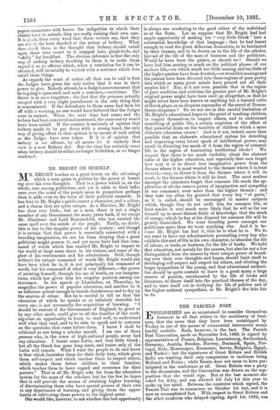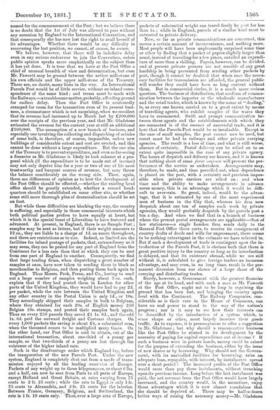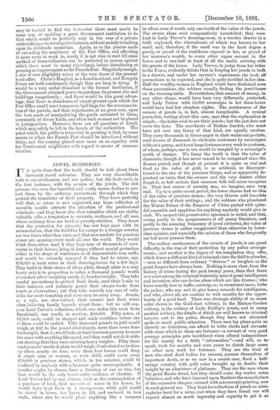THE PARCELS POST.
-ENGLISHMEN are so accustomed to consider themselves foremost in all that relates to the machinery of busi- ness, that the news that they have been outstripped by Turkey in one of the means of commercial intercourse seems hardly credible. Such, however, is the fact. The Parcels Post Convention, made on November 3rd, 1880, is signed by representatives of France, Belgium, Luxembourg, Switzerland, Germany, Austria, Sweden, Norway, Denmark, Spain, Por- tugal, Italy, Montenegro, Roumania, Servia, Bulgaria, Egypt, and Turkey ; but the signatures of Great Britain and British India are wanting, their only companions in tardiness being Holland and Persia ; while Russia does not seem to have par- ticipated in the conference at all. Great Britain was a party to the discussions, and the Convention was drawn on the sup- position that she would sign. But at the last moment she asked for delay, and was allowed till July 1st this year to make up her mind. Between the countries which signed, the Parcels Post was to commence on October 1st last, and it is now an accomplished fact. With respect to Great Britain and the other countries who delayed signing, April 1st, 1882, was
named for the commencement of the Post ; but we believe there is no doubt that the 1st of July was allowed to pass without any accession by England to the International Convention, and that consequently she has now lost the right to avail herself of its advantages. Whether there would be any difficulty in recovering the lost position, we cannot, of course, be aware.
We believe, however, that there will be indefinite delay even in any serious endeavour to join the Convention, unless public opinion speaks more emphatically on the subject than it has yet done. It is true that we have at the Post Office a chief of unusual breadth of view and determination, but even Mr. Fawcett may be ground between the nether mill-stone of his own officials and the upper mill-stone of the Treasury. There are, no doubt, many lions in the way. An International Parcels Post would be of little service, without an inland corre- spondence of the same kind ; and terms must be made with the Railways,—a troublesome matter, probably, affording ground for endless delay. Then the Post Office is confessedly cramped for room for the transaction even of its present busi- ness, a circumstance which is not surprising, when we recollect that its revenue had increased up to March last by £200,000 over the receipts of the previous year, and that Mr. Gladstone estimated the revenue for the current year at still an additional £100,000. The assumption of a new branch of business, and especially one involving the collecting and dispatching of articles of some bulk, is therefore, of course, impossible, unless new buildings of considerable extent and cost are erected, and this cannot be done without a large expenditure. But the one aim of the Treasury is to prevent expenditure, and even so far-seeing a financier as Mr. Gladstone is likely to look askance at a pro- posal which (if the expenditure is to be made out of income) may not only deprive him for a year or two of one of his most trustworthy and buoyant sources of revenue, but may throw the balance considerably on the wrong side. Then, again, there are differences of opinion as to how the development of the Post Office should be effected,—whether the existing head office should be greatly extended, whether a second head- quarters should be established on some other site, or whether some still more thorough plan of decentralisation should be set on foot.
But while these difficulties are blocking the way, the country is suffering, and especially in those commercial interests which both political parties profess to have equally at heart, but which it is the special boast of Liberalism to have fostered and advanced. At present, in England, there is no Sample Post ; samples may be sent as letters, but if their weight amounts to 12 oz., they are liable to a charge of ld. an ounce throughout, and there are restrictions as to size. Indeed, so limited are the facilities for inland postage of packets, that, extraordinary as it may seem, they can be posted for any part of England from the Continent for a less rate than that at which they can be sent from one part of England to another. Consequently, we find that large trading firms, when dispatching a great number of samples at once, have now taken to sending them in block as merchandise to Belgium, and then posting them back again to England. Thus Messrs. Peek, Frean, and Co., having to send out a large number of samples weighing about 3 oz. each, explain that if they had posted them in London for other parts of the United Kingdom, they would have had to pay 2d. per packet, while the rate between the United Kingdom and any other country in the Postal Union is only ld., or 10c. They accordingly shipped their samples in bulk to Belgium, where they obtained for each 20s. of English money 250 Belgian 10c. stamps, and posted their samples back again. Thus on every 250 parcels they saved £1 ls. 8d., and the odd ls. 8d. paid the outward freight and Customs charges. On every 1,000 packets the saving is about £4, a substantial sum, when the thousand comes to be multiplied many times. On the other hand, our Post Office is said to obtain, out of the international transaction, about one-third of a penny per sample, so that two-thirds of a penny are lost through the existence of the higher inland rate.
Such is the disadvantage under which England lay, before the inauguration of the new Parcels Post. Under the new system, England is completely shut out from a mode of trans- mission enjoyed by all the leading countries of Europe. Packets of any weight up to three kilogrammes, or about G lbs. and a half, can now be sent from Paris to all parts of Europe, except Holland and Great Britain, at rates varying from 75 cents to 2 fr. 25 cents ; while the rate to Egypt is only 1 fr. 75 cents to Alexandria, and 2 fr. 25 cents for the interior. Between France, Germany, Belgium, and Switzerland, the rate is 1 fr. 10 cents only. Thus, over a large area of Europe, packets of substantial weight can travel freely by post for less than ls.; while in England, parcels of a similar kind must be entrusted to private delivery. Nov, so far as private communications are concerned, this means a certain amount of inconvenience, and nothing more.
Most people will have been unpleasantly surprised some time or other by finding that a packet of papers slightly larger than usual, instead of travelling for a few pence, entailed an expendi- ture of more than a shilling. Papers, however, can be divided, and at present private persons are not sensible of any great hardship in being prevented from sending other packets by post, though it cannot be doubted that when once the neces- sary facilities for transmission are afforded, the general public will wonder they could have been so long content without them. But in commercial circles, it is a much more serious question. The business of distribution, that medium of commu- nication between the importer or the wholesale manufacturer and the retail trader, which is known by the name of " dealing," is, as every one knows, carried on to a great extent by means of travelling agents, who exhibit samples of the wares they have to recommend. Swift and prompt communication be- tween these agents and the establishments with which they
are connected is of the essence of successful trade, and it is here that the Parcels•Post would be so invaluable. Except in the case of small samples, the post cannot now be used, but resort must be had to railways and other private carrying agencies. The result is a loss of time, and what is still worse, absence of certainty. Postal delivery can be relied on to an extent quite impossible in the case of any private agency. The hours of dispatch and delivery are known, and it is known that nothing short of some force majeure will prevent the per- formance of the service as undertaken. Arrangements may, therefore, be made, and time parcelled out, when dependence is placed on the post, with a certainty and precision impos- sible when private carriers are relied on ; and whew. time and the ability to make arrangements in advance mean money, this is an advantage which it would be diffi- cult to over-rate. So great, indeed, would be the advan- tage, that it is estimated by one of the most experienced men of business in the City that, whereas his firm now despatch about one ton of samples each week by private agencies, they would probably despatch by the parcels post a
ton a day. And when we find that in a branch of business where the present postal arrangements are applicable—that of law stationers—a single London firm sends daily to the General Post Office three carts, to receive its consignment of country drafts of deeds and wills for engrossment, there seems to be nothing extravagant in the estimate we have referred to. But if such a development of trade is contingent upon the in- troduction of the Parcels Post, it is obvious both that there is great positive injury to the country so long as its introduction is delayed, and that its existence abroad, while we are still without it, is calculated to give foreign traders an immense advantage, and may even, in no long time, result in the per- manent diversion from our shores of a large share of the carrying and distributing trades.
Surely, however, a Government with the greatest financier of the age at its head, and with such a man as Mr. Fawcett at the Post Office, ought not to be long in regaining the ground that has been lost, and bringing the country again
level with the Continent. The Railway Companies, con- siderable as is their vote in the House of Commons, can have no real power to stand in the way of the nation's progress ; nor is it easy to see how their interests can be damnified by the introduction of a system which, in some shape or other, must largely increase their goods traffic. As to expense, it is presumptuous to offer a suggestion to Mr. Gladstone ; but why should a remunerative business like the Post Office be stinted in its development by the necessity of paying for capital expenditure out of income ? If such a business were in private hands, money could be raised for the purpose of extending the business, either by the issue of new shares or by borrowing. Why should not the Govern- ment, with its unrivalled facilities for borrowing, raise an adequate loan, repayable, with interest, by instalments spread over a short period ? The increased profits of the Post Office would more than pay these instalments, without trenching upon its previous income. Long before the last instalment was paid, the net revenue from the Post Office would have largely increased., and the country would, in the meantime, enjoy those advantages which it is now almost scandalous that
she should be deprived of. There may be half-a-dozen better ways of raising the necessary money—Mr. Gladstone may be trusted to find the best—but there must surely be some way of enabling a great Government institution to do that which would be perfectly easy in the case of a private undertaking,—to develope its business, without unduly trenching upon its dividends meantime. Again, as to the precise mode of extending the machinery of the Post Office, and affording it more room to work in, surely it is not wise to wait till some method of decentralisation can be perfected (a system against which there must be many objections), before introducing so pressing an improvement as the Parcels Post. Singularly enough, a site of rare eligibility exists at the very doors of the present head office. Christ's Hospital, as a London school, and Newgate Prison are both condemned, though they are long in dying. It would be a very useful stimulant to the former institution, if the Government obtained power to purchase its present site and buildings compulsorily ; and there would be this great advan- tage, that there is abundance of vacant ground upon which the Post Office could erect temporary buildings for the accommoda- tion of the parcels, and thus experiment, at no great cost, upon the best mode of manipulating the goods entrusted to them, necessarily of divers kinds, and often such as must not be placed in juxtaposition. However, these are all questions of detail, which may safely be left in the hands of the authorities. The point which the public is interested in preising is that, by some means or other, the Parcels Post should be introduced without delay, and the country placed once more on an equality with her Continental neighbours with regard to means of commu- nication.








































 Previous page
Previous page